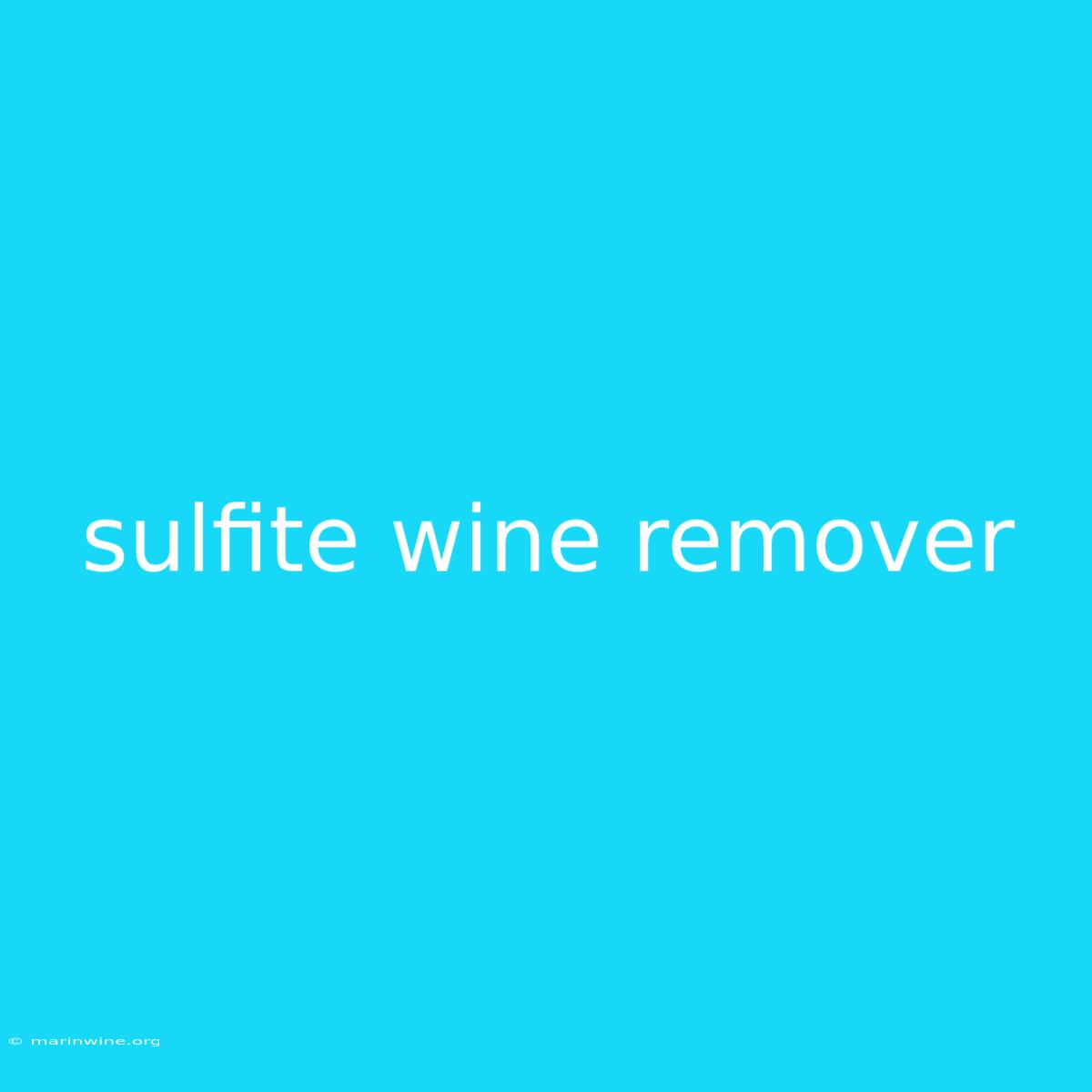Unveiling the Mystery: Sulfite Wine Remover - A Must-Have for Sensitive Palates?
Have you ever experienced a headache after enjoying a glass of wine? This might be due to sulfites, a common additive used in winemaking. But fear not, there are solutions! Sulfite wine removers offer a promising way to enjoy your favorite wine without the potential discomfort.
Why It Matters: Sulfites in Wine and Your Health
Sulfites are naturally occurring compounds in wine, but they are also added as preservatives to prevent spoilage. While most people tolerate them, some individuals experience adverse reactions like headaches, skin rashes, or digestive issues. This has led to a growing interest in sulfite-free wines and sulfite removal techniques.
Key Takeaways of Sulfite Wine Removers
| Feature | Description |
|---|---|
| Purpose: | To reduce or eliminate sulfites from wine. |
| Method: | Utilizes various methods, including oxidation, filtration, or binding. |
| Benefits: | Can help reduce sulfite-related reactions. |
| Limitations: | May affect the wine's flavor and aroma. |
| Availability: | Sold online and at specialty wine stores. |
Sulfite Wine Removers: A Deeper Dive
Introduction
Sulfite wine removers are devices or solutions designed to decrease the sulfite content in wine. They offer a possible solution for individuals sensitive to sulfites, allowing them to enjoy wine without experiencing unwanted reactions.
Key Aspects
- Types of Removers: There are various types of sulfite wine removers, including:
- Oxidation-based: Expose the wine to oxygen to oxidize the sulfites.
- Filtration: Use filters to physically remove sulfites from the wine.
- Binding agents: Introduce substances that bind to sulfites, effectively removing them.
- Effectiveness: The effectiveness of sulfite wine removers can vary depending on the method used, the concentration of sulfites in the wine, and the specific wine itself.
- Impact on Flavor: Using a sulfite remover may subtly alter the wine's flavor and aroma. Some consumers report noticing a slight change in the wine's character, while others find the impact minimal.
Oxidation-Based Sulfite Removal
This method utilizes the natural reaction of sulfites with oxygen. By exposing the wine to air, the sulfites are oxidized, effectively converting them into less reactive compounds. This process typically involves pouring the wine into a decanter or using an aerator, allowing for maximum contact with air.
Filtration
Sulfite filtration utilizes specialized filters that physically remove sulfites from the wine. This process typically involves pouring the wine through a filter that traps sulfite molecules, leaving behind the wine with reduced sulfite levels.
Binding Agents
Binding agents work by introducing substances that chemically bind to sulfites, removing them from the wine. These agents can be added directly to the wine or incorporated into filters.
FAQ for Sulfite Wine Removers
Introduction
Sulfite wine removers have become a popular topic among wine enthusiasts and individuals seeking to enjoy wine without experiencing adverse reactions. Here are some frequently asked questions about this technology.
Questions and Answers
- Q: Are sulfite wine removers safe?
- A: Most sulfite wine removers are generally considered safe for use. However, it's important to follow the manufacturer's instructions and use them as directed.
- Q: Do sulfite wine removers completely eliminate sulfites?
- A: Most sulfite removers can significantly reduce the sulfite content in wine but might not completely eliminate it.
- Q: Will a sulfite remover alter the wine's flavor?
- A: Some sulfite removers might slightly alter the wine's flavor and aroma. This is usually a subtle change, but it can vary depending on the remover used and the wine's characteristics.
- Q: Where can I buy sulfite wine removers?
- A: Sulfite wine removers are often available online and at specialty wine stores.
- Q: How do I use a sulfite wine remover?
- A: Follow the manufacturer's instructions. There are often specific procedures to follow for each type of remover.
- Q: Can I use sulfite removers on all wines?
- A: While sulfite removers work on most wines, some wines may be more sensitive to the process than others.
Summary
Sulfite wine removers offer a way to reduce the sulfite content in wine, potentially alleviating sensitivities. However, remember that they might not completely eliminate sulfites and may subtly alter the wine's flavor.
Tips for Using Sulfite Wine Removers
Introduction
Using a sulfite wine remover is a simple process that can significantly enhance your wine-drinking experience. Here are a few tips to ensure you get the most out of your sulfite remover.
Tips
- Choose the Right Remover: Select a remover designed for your specific needs and the types of wines you enjoy.
- Follow Instructions: Always read and follow the manufacturer's instructions carefully. This ensures safe and effective use.
- Start Small: If you are new to sulfite removers, start with a small amount of wine and gradually increase the amount as you become more familiar with the process.
- Try Different Methods: Experiment with different sulfite removal methods to find what works best for you and your preferred wines.
- Store Properly: Follow storage guidelines for your sulfite remover to maintain its effectiveness.
Summary
Using a sulfite wine remover can enhance your enjoyment of wine by potentially mitigating sensitivities.
Summary of Sulfite Wine Removers
Sulfite wine removers offer a possible solution for individuals sensitive to sulfites. These devices or solutions can effectively reduce the sulfite content in wine, enabling individuals to enjoy their favorite wines without experiencing unwanted reactions. While they may slightly alter the wine's flavor, sulfite removers provide a valuable tool for those seeking a more enjoyable and comfortable wine-drinking experience.
Closing Message
The world of wine is filled with possibilities, and sulfite removers represent a step toward greater inclusivity. By addressing sulfite sensitivities, these tools allow a wider range of individuals to appreciate the complex and nuanced flavors of wine. As we continue to explore and understand the world of sulfites, we can look forward to more innovative solutions that ensure everyone can enjoy the pleasures of wine.

